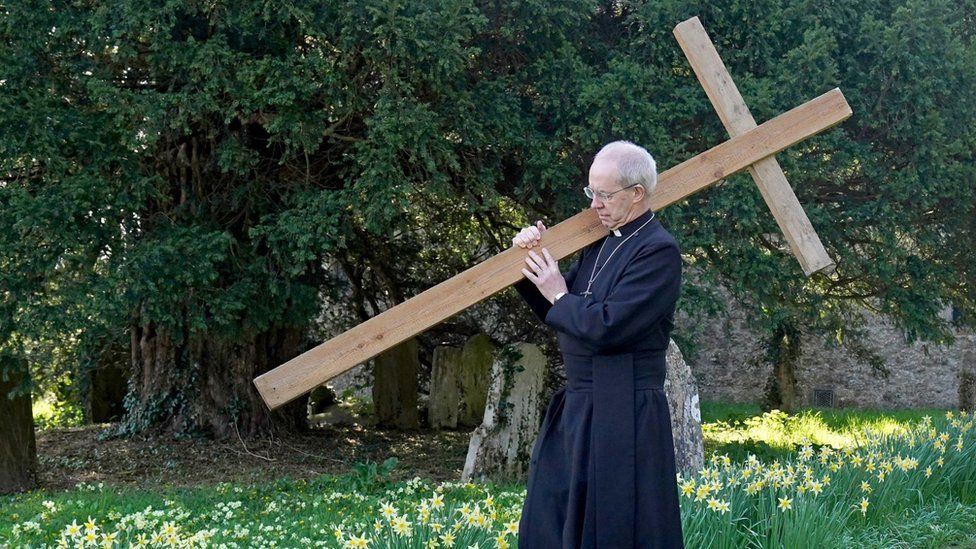The government's plan to send some asylum seekers from the UK to Rwanda is "the opposite of the nature of God", the Archbishop of Canterbury has said.
In his Easter sermon, Justin Welby said Christ's resurrection was not the time for "subcontracting our responsibilities".
He also called for a ceasefire in Ukraine and spoke of his concern over the cost of living crisis.
The government says change is needed to protect lives from people smugglers.
Under the £120m scheme - which was announced this week - people deemed to have entered the UK unlawfully will be transported to the east African country, where they will be allowed to apply for the right to settle.
It has faced widespread opposition, with more than 160 charities and campaign groups urging ministers to scrap what they described as a "cruel" policy. It has also been criticised by opposition parties and some Conservatives.
Speaking at Canterbury Cathedral on Easter Sunday, Mr Welby said there were "serious ethical questions about sending asylum seekers overseas".
He added: "The details are for politics and politicians. The principle must stand the judgment of God, and it cannot.
"...And it cannot carry the weight of our national responsibility as a country formed by Christian values; because sub-contracting out our responsibilities, even to a country that seeks to do well like Rwanda, is the opposite of the nature of God, who himself took responsibility for our failures."
The Home Office defended the plan from the archbishop's criticisms, saying the UK has a "proud history" of supporting those in need and resettlement programmes have provided "safe and legal routes to better futures" for hundreds of thousands.
"However, the world is facing a global migration crisis on an unprecedented scale and change is needed to prevent vile people smugglers putting people's lives at risk and to fix the broken global asylum system," a spokesperson said.
The Home Office said Rwanda is "safe and secure" and will process claims in accordance with international human rights laws.
On Friday, it emerged that Home Secretary Priti Patel had to take personal responsibility for the plan, issuing a rare "ministerial direction" amid concern from officials that the costs of the scheme are not fully known so the department could not say if it would offer value for money.
The Home Office has published the exchange of letters between Matthew Rycroft, the department's top civil servant, and Ms Patel, in which he explains his thinking.
It is only the second time such a ministerial direction has been issued at the Home Office in the last 30 years.
2px presentational grey line
How will the Rwanda asylum scheme work?
On Thursday, the UK and Rwanda unveiled a new deal that will see some asylum seekers given a one-way ticket to the east African nation.
Here's what we know about the scheme so far:
The scheme will focus mainly on single men arriving in the UK illegally in small boats or lorries
People who have arrived in the UK by such means since 1 January may be sent to Rwanda, where their asylum claims will be processed
While their claims are being considered, they will be given accommodation and support and would be free to come and go from their lodgings at all times
Those whose asylum claims are accepted would be helped to build a "new life" in Rwanda, with up to five years' access to education and support there, the UK government says
Those whose claims are rejected will be given the chance to apply to remain in Rwanda or be removed to their country of origin or another country where they have the right to reside
The UK government has said the first asylum seekers could be flown to Rwanda within weeks
Civil service unions said the policy was "inhumane" but that officials would have to implement it or leave.
The archbishop's Easter sermon also made reference to "the greatest cost-of-living crisis we have known" with families across the country "waking up to cold homes and empty stomachs".
He said the struggle to pay for essentials was their first thought of the day and they felt "overwhelmed by the pressures".
Others bereaved in the pandemic grappled with "the continued deep sense of loss", including those who could not say a proper farewell to loved ones, the archbishop added.
Reflecting on the meaning of the resurrection for individuals, he said: "In dying for us, God sees and knows the wounds that cause us so much pain.
"He hears the cry of the mothers in Ukraine, he sees the fear of boys too young to become soldiers, and he knows the vulnerability of the orphans and refugees.
"Closer to home, he sees the humiliation of the grandparent visiting the food bank for the first time, the desperate choice of parents in poverty and the grief and weariness of the pandemic."
BBC





